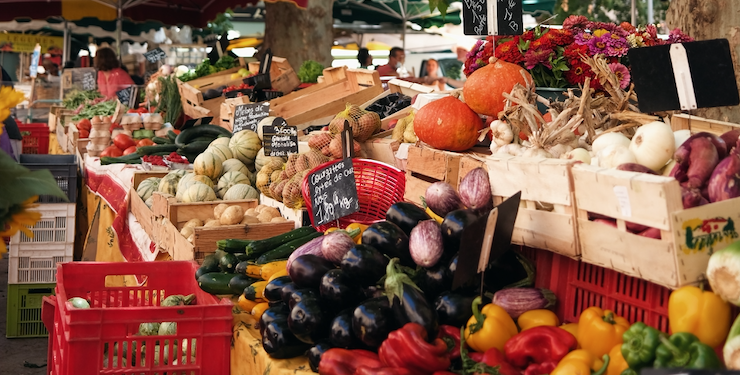Eating food grown and produced locally is not only beneficial to the environment, it’s also better for your health and counteracts the overwhelming profitability of big food businesses.
Local = Lack of Relocation
When you buy locally grown produce at a farmers’ market it’s guaranteed to be fresher and more nutritious than the produce you find at a chain grocery store. Unless labeled otherwise, store-bought produce is often transported across the country, sitting stagnant in the back of a truck and then on grocery store shelves.
The more time passes after produce is picked, the less nutritious it becomes. Beneficial vitamins and antioxidants begin to decline shortly after harvest, therefore locally grown food usually contains more nutritional value than food from a distant place.
Without the need for relocation, CO2 emissions from trucks, planes, or other modes of food transportation are removed. Transporting food in refrigerated crates accounts for one-fifth of all carbon emissions in the food system according to Nature. Buying food that doesn’t have to travel far to be sold can offset these effects.
Additionally, local food is often less packaged, which minimizes the use of plastic and generates less waste. Bringing a reusable bag to carry your produce after your purchase will reduce waste as well.
Supporting Small Businesses
There are many economic benefits to buying produce from a farmers’ market or farm stand as opposed to grocery stores. Mainly, purchasing from small businesses helps to displace the uneven profitability of major food brands.
This inequality is particularly evident when it comes to processed foods, where billion-dollar companies dominate the industry and leave smaller brands to suffer. As a result, big food businesses slack on their product quality and only focus on maintaining their share of the market. They strive for more money, disregarding the interest (and often health) of consumers.
Local farmers care about their customers, working hard every day to produce the best quality items that will leave them satisfied and coming back for more. Choosing to purchase from a small business assures you greater customer attention and supports your region’s economy.
Eating locally is often more nutritious, encourages sustainable farming practices, helps support the local economy and reduces our environmental impact.
Check out our new monthly seasonal produce calendar. Why not try something in season this August?#eatlocal #seasonalproduce pic.twitter.com/dKjXyQoi5q
— Food Matters (@FoodMatters_org) August 1, 2022
Easy Eats
Eating locally is much easier than it seems. While some people may choose to embark on the more involved journey of personal gardening, eating locally can also be achieved by simply reading the labels at grocery stores. Many stores have locally grown sections for produce that are easily distinguishable if you peruse the labels or ask the produce manager.
Related Articles: Strengthening Urban Food Systems in Times of Crisis | Future of Food: Reducing Waste
The easiest way to eat locally is by purchasing from farmers’ markets or farm stands. These businesses are often family run and produce food for a living, warranting the best quality and honest business operations.
Finally, local food can be consumed at farm-to-table restaurants. Conduct research to learn which of your favorite restaurants uphold this practice.
It's #NationalFarmersMarketWeek! Celebrate by shopping and eating locally to reduce your food miles (distance food travels to reach you) and your carbon emissions. Click the link in our bio to learn more about reducing food waste. #RCWaste #RivCo #FarmersMarket #Local #FreshFood pic.twitter.com/8fcaLB99Bg
— RCWaste (@RCWaste) August 7, 2022
Bits for the Benefit of the Environment
Even a small change helps. If you aren’t ready to give up Driscoll’s berries just yet, ask yourself if there are other produce you normally buy that you would be willing to swap. And the next time you come across a farm stand, consider stopping by – just to look around. You may be surprised to find sweeter, juicier, and fresher berries; incomparable to Driscoll.
Editor’s Note: The opinions expressed here by the authors are their own, not those of Impakter.com — In the Featured Photo: An outdoor vegetable market in Aix-en-Provence, France. Featured Photo Credit: Christian Mackie.










